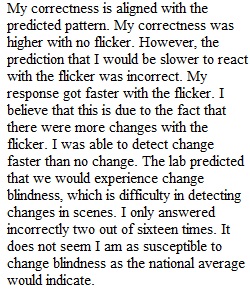


Q Overview Can you pay attention to everything? Are we really as good as we think we are at detecting changes around us? Can we easily focus on one thing and ignore everything else? These labs will help you see that attention is a limited resource. However, your attentional system has evolved to be adaptive and efficient for the types of environments you will typically encounter. In the Change Detection lab, you will see that, as long as there are no interruptions to the entire visual field, you can rely on motion detection to detect subtle changes in the visual field. Both the Simon Effect and Stroop Effect labs will show you how your attention is quickest when the type and location of the stimuli are consistent, respectively. The Spatial Cueing lab demonstrates how we can control our area of maximal attention, albeit in a limited part of our visual field. By knowing what variables maximize or minimize our attention, psychologists can help us make the most of this ability. Prompt Complete the following labs: • Change Detection • Simon Effect • Spatial Cueing • Stroop Effect Then complete the Module Two Lab Worksheet Template Word Document. Specifically, you must address the following rubric criteria: • Record data and include screenshots of results for all module labs. • For the Change Detection lab, address lab questions accurately. • For the Simon Effect lab, address lab questions accurately. • For the Spatial Cueing lab, address lab questions accurately. • For the Stroop Effect lab, address lab questions accurately. • Address the module question accurately. Guidelines for Submission Submit your completed Module Two Lab Worksheet Template.
View Related Questions